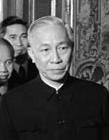Le Duc Tho facts for kids
Quick facts for kids
Lê Đức Thọ
|
|
|---|---|
 |
|
| Head of the Central Organizing Commission of the Communist Party of Vietnam | |
| In office 1976–1980 |
|
| Preceded by | Lê Văn Lương |
| Succeeded by | Nguyễn Đức Tâm |
| In office 1956–1973 |
|
| Preceded by | Lê Văn Lương |
| Succeeded by | Lê Văn Lương |
| Personal details | |
| Born |
Phan Đình Khải
14 October 1911 Nam Định Province, French Indochina |
| Died | 13 October 1990 (aged 78) Hanoi, Socialist Republic of Vietnam |
| Nationality | Vietnamese |
| Political party | Communist Party of Vietnam |
Lê Đức Thọ (born Phan Đình Khải; October 14, 1911 – October 13, 1990) was an important Vietnamese leader. He was a revolutionary, a general, a diplomat, and a politician. He was born in Hà Nam Province, Vietnam.
Lê Đức Thọ is famous for his role in the peace talks that ended the Vietnam War. In 1973, he was offered the Nobel Peace Prize. He was supposed to share it with United States Secretary of State Henry Kissinger. However, Lê Đức Thọ did not accept the prize. He said he would only accept it when "peace is truly established" in Vietnam. He passed away on October 13, 1990, in Hanoi, Vietnam.
Contents
Early Life and Political Start
Lê Đức Thọ was born Phan Đình Khải. He joined the revolutionary movement against French rule in Vietnam very early. In 1930, he helped create the Indochinese Communist Party. This party later became the Communist Party of Vietnam. Because of his political activities, he was arrested by the French. He spent many years in French prisons.
Role in the Vietnam War
During the Vietnam War, Lê Đức Thọ was a key leader for North Vietnam. He was a member of the Politburo of the Communist Party of Vietnam. This was the main decision-making group in the country. He played a big part in guiding Vietnam's efforts during the war.
The Paris Peace Talks
From 1968 to 1973, Lê Đức Thọ was the chief negotiator for North Vietnam. He met with Henry Kissinger, who was the main negotiator for the United States. They held secret talks in Paris, France. These talks were very difficult and lasted for many years.
Reaching a Peace Agreement
Finally, in January 1973, they reached an agreement. This was called the Paris Peace Accords. This agreement aimed to end the war and restore peace in Vietnam. It led to the withdrawal of U.S. troops from Vietnam.
Declining the Nobel Peace Prize
In 1973, Lê Đức Thọ and Henry Kissinger were jointly awarded the Nobel Peace Prize. They received it for their work on the Paris Peace Accords. However, Lê Đức Thọ chose not to accept the award.
Why He Declined
Lê Đức Thọ believed that true peace had not yet come to Vietnam. Even after the Paris Agreement, fighting continued in parts of Vietnam. He felt that accepting the prize would mean peace was fully achieved, which he did not believe was true at that time. He wanted to wait until Vietnam was completely unified and peaceful.
Later Life and Legacy
After the Vietnam War ended in 1975, Lê Đức Thọ continued to be an important figure. He held high positions in the Communist Party of Vietnam. He was the head of the Central Organizing Commission. This role involved managing the party's organization and members. He served in this position from 1976 to 1980.
Lê Đức Thọ passed away in 1990. He is remembered as a dedicated revolutionary and a key leader in Vietnam's history. His decision to decline the Nobel Peace Prize showed his strong belief that peace must be truly established.
See also
 In Spanish: Lê Ðức Thọ para niños
In Spanish: Lê Ðức Thọ para niños
 | Valerie Thomas |
 | Frederick McKinley Jones |
 | George Edward Alcorn Jr. |
 | Thomas Mensah |

